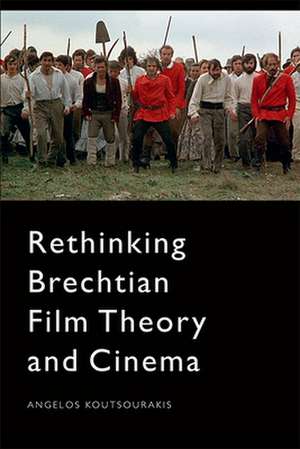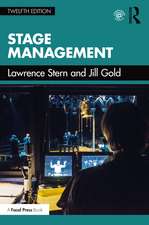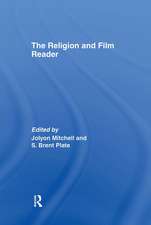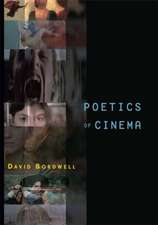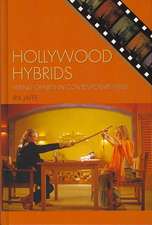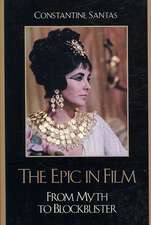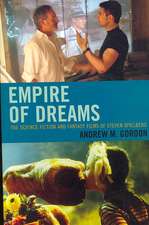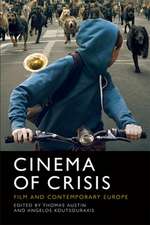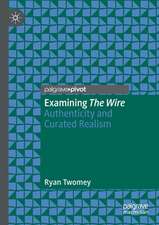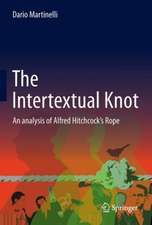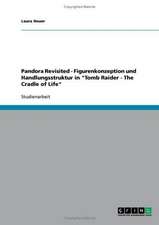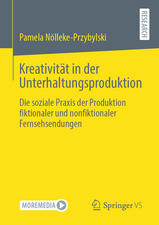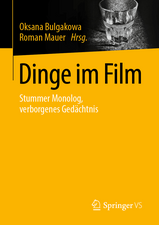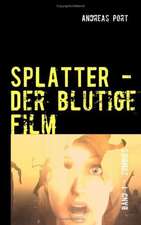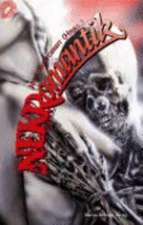Rethinking Brechtian Film Theory and Cinema
Autor Angelos Koutsourakisen Limba Engleză Hardback – 2 oct 2018
| Toate formatele și edițiile | Preț | Express |
|---|---|---|
| Paperback (1) | 186.35 lei 3-5 săpt. | |
| EDINBURGH UNIVERSITY PRESS – 25 aug 2020 | 186.35 lei 3-5 săpt. | |
| Hardback (1) | 553.84 lei 3-5 săpt. | |
| EDINBURGH UNIVERSITY PRESS – 2 oct 2018 | 553.84 lei 3-5 săpt. |
Preț: 553.84 lei
Preț vechi: 676.62 lei
-18% Nou
Puncte Express: 831
Preț estimativ în valută:
105.98€ • 109.33$ • 88.44£
105.98€ • 109.33$ • 88.44£
Carte disponibilă
Livrare economică 05-19 martie
Preluare comenzi: 021 569.72.76
Specificații
ISBN-13: 9781474418904
ISBN-10: 1474418902
Pagini: 272
Ilustrații: 90 B/W illustrations 65 black & white, 2x8pp colour plate sections of varying size
Dimensiuni: 161 x 241 x 22 mm
Greutate: 0.55 kg
Editura: EDINBURGH UNIVERSITY PRESS
ISBN-10: 1474418902
Pagini: 272
Ilustrații: 90 B/W illustrations 65 black & white, 2x8pp colour plate sections of varying size
Dimensiuni: 161 x 241 x 22 mm
Greutate: 0.55 kg
Editura: EDINBURGH UNIVERSITY PRESS
Descriere
Making a compelling argument for the continuing relevance of Brechtian film theory and cinema, this book offers new research and analysis of Brecht the film and media theorist, placing his scattered writings on the subject within the lively film theory debates that took place in Europe between the 1920s-1960s.
Notă biografică
Angelos Koutsourakis is an Associate Professor in Film and Cultural Studies at the Centre for World Cinemas and Digital Cultures, University of Leeds. He is the author of Rethinking Brechtian Film Theory and Cinema (2018), Politics as Form in Lars von Trier (2013) and the co-editor of The Cinema of Theo Angelopoulos (2015) and Cinema of Crisis: Film and Contemporary Europe (2020).
Cuprins
Acknowledgements
Introduction
Part 1: Brechtian Film Theory
Chapter 1: Key Concepts
The Dialectic
The Individual as a Nexus
The Gestic Principle: Between Brecht, Eisenstein, and Deleuze
Gestus and Cultural Techniques
'Humour is a Sense of Distance'
Chapter 2: Photography and Film
The Photographic Image
The Apparatus and the Agency of the Machine
Chapter 3: Modernism as Realism
Brecht, Bazin, and Lukács
On Sound/Music
Some Thoughts on Brecht and Genre
Chapter 4: Brecht in Film Theory
From Close Up to the Grand Theory
Noël Burch
The Cognitivist Critique
Rancière and the post-Brechtian
Part 2: Brechtian Cinema
The Revisionist History Film
Chapter 5: Re-visioning History
Defining the Revisionist History Film
Totality is history: Szegénylegények (The Round-Up, 1966) and Allonsanfàn (1974)
Chapter 6: Revisiting National Traumas
Dealing with Fascism: Professor Mamlock (1961), Das schreckliche Mädchen (The Nasty Girl, 1990)
Epic Cinema: ¿ T¿as¿¿ (The Travelling Players, 1975), 1900 (1976)
The Essay Film
Chapter 7: Beyond Auteurism: the Dialectics of the Essay Film
The Disappearance of the Subject in Writing
Representation as Unfinished Material: Thomas Heise's Material (2009)
Chapter 8: Pedagogical Essay Films
Agitprop and the Crisis: Brecht die Macht der Manipulateure (Break the Power of the Manipulators, 1967), Fascism Inc. (2014)
The Lehrstück on Film: La Commune (Paris, 1871) (2000), The Act of Killing (2012)
Cinemas of Cruelty
Chapter 9: Brecht and Artaud
The Politics of Cruelty: Brecht and Artaud
From Theatre to Film: The Brig (1964), Marat/Sade (1967)
Chapter 10: Cruelty as Anti-commodity
Everyday Fascism: Import/Export (2007), The Rebellion of Red Maria (2011)
The Postdramatic on Screen: Katzelmacher (1969), Die linkshändige Frau (The Left-handed Woman, 1978)
Epilogue
Bibliography
Index
Introduction
Part 1: Brechtian Film Theory
Chapter 1: Key Concepts
The Dialectic
The Individual as a Nexus
The Gestic Principle: Between Brecht, Eisenstein, and Deleuze
Gestus and Cultural Techniques
'Humour is a Sense of Distance'
Chapter 2: Photography and Film
The Photographic Image
The Apparatus and the Agency of the Machine
Chapter 3: Modernism as Realism
Brecht, Bazin, and Lukács
On Sound/Music
Some Thoughts on Brecht and Genre
Chapter 4: Brecht in Film Theory
From Close Up to the Grand Theory
Noël Burch
The Cognitivist Critique
Rancière and the post-Brechtian
Part 2: Brechtian Cinema
The Revisionist History Film
Chapter 5: Re-visioning History
Defining the Revisionist History Film
Totality is history: Szegénylegények (The Round-Up, 1966) and Allonsanfàn (1974)
Chapter 6: Revisiting National Traumas
Dealing with Fascism: Professor Mamlock (1961), Das schreckliche Mädchen (The Nasty Girl, 1990)
Epic Cinema: ¿ T¿as¿¿ (The Travelling Players, 1975), 1900 (1976)
The Essay Film
Chapter 7: Beyond Auteurism: the Dialectics of the Essay Film
The Disappearance of the Subject in Writing
Representation as Unfinished Material: Thomas Heise's Material (2009)
Chapter 8: Pedagogical Essay Films
Agitprop and the Crisis: Brecht die Macht der Manipulateure (Break the Power of the Manipulators, 1967), Fascism Inc. (2014)
The Lehrstück on Film: La Commune (Paris, 1871) (2000), The Act of Killing (2012)
Cinemas of Cruelty
Chapter 9: Brecht and Artaud
The Politics of Cruelty: Brecht and Artaud
From Theatre to Film: The Brig (1964), Marat/Sade (1967)
Chapter 10: Cruelty as Anti-commodity
Everyday Fascism: Import/Export (2007), The Rebellion of Red Maria (2011)
The Postdramatic on Screen: Katzelmacher (1969), Die linkshändige Frau (The Left-handed Woman, 1978)
Epilogue
Bibliography
Index
